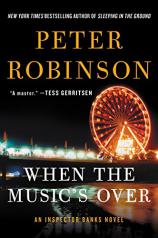When the Music's Over: An Inspector Banks Novel
Review
When the Music's Over: An Inspector Banks Novel
WHEN THE MUSIC’S OVER is a relaunch of sorts of Peter Robinson’s long-running and always terrific Inspector Banks series. Alan Banks is no longer an inspector, strictly speaking, having been promoted to Detective Superintendent just before the book begins. But, as is demonstrated time and again throughout this latest installment, he is not afraid to get his hands dirty right up to his shoulders in an investigation.
"WHEN THE MUSIC’S OVER succeeds as the solid police procedural that we have come to expect from Robinson and that he will continue to deliver in the future."
There are two equally intriguing cases --- one concerning an event that occurred almost a half-century ago, the other much more immediate --- that are running through the course of the novel. The former is an allegation that Danny Caxton, a popular British entertainer of several decades’ longevity, sexually abused a female minor in 1967. The victim, a woman named Linda Palmer, is now in her senior years and is a poet of some renown. Her reason for seeking justice after all this time has passed is driven in part by recent real-world events --- a series of celebrity convictions for molestation in Great Britain. Palmer additionally alleges that a second man --- someone who she would know on sight but is otherwise unable to identify --- raped her during the same attack. Now in his 80s, Caxton denies the rape or even ever having met Palmer, alleging that he had women throwing themselves at him in his heyday so he never needed to assault anyone.
Banks and DS Winsome Jackman try to gather evidence from an extremely cold trail that leads them to a decade-old unsolved murder, among other things. The latter concerns the horrific discovery of a teenage girl who appears to have been raped and beaten to death on an all-but-deserted rural road. Making matters worse, and all the more mysterious, is that the attack appears to have been committed by two separate and unrelated parties. There are plenty of red herrings in this case, not the least of which is discovering the identity of the victim, who is not immediately reported missing by anyone. It is this second case that is the more complex one, and is not any easier to solve than the older, cold one, given the social difficulties and lack of cooperation on the part of all within the victim’s proximity.
Interestingly enough, the cases do not link up at any point in the book --- a popular plot device utilized in mysteries, particularly in police procedurals --- but there is a subtle connection nonetheless, that being the commonality of the victims, then and now. While much has changed over the course of five decades, much remains the same.
Robinson attempts to hew the line between reality and political correctness, and succeeds, though he no doubt will find supporters and detractors on both sides of some of the issues he explores. Events have also overtaken some of the points he attempts to make, given the distance in time between his authorship of the book and increasing acts of violence committed by certain segments of the British population. Nevertheless, WHEN THE MUSIC’S OVER succeeds as the solid police procedural that we have come to expect from Robinson and that he will continue to deliver in the future.
Reviewed by Joe Hartlaub on August 12, 2016





